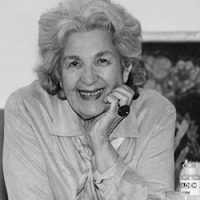

Miriam Schapiro (or Shapiro) is a Canadian-born artist based in America. She is a pioneer of feminist art. She is also considered part of the Pattern and Decoration art movement.
She was born in Toronto, Canada and studied at the State University of Iowa, where she met the artist Paul Brach, whom she married in 1946. By 1951 they moved to New York City and befriended many of the artists in the downtown Abstract expressionist New York School, including Joan Mitchell, Larry Rivers, Knox Martin and Michael Goldberg. Shapiro and Brach lived in New York City during the 1950s and 1960s. During this period Shapiro had a successful career as an abstract expressionist painter in the hard-edge style.
In the 1970s she moved to California, establishing the Feminist Art Program at the California Institute of the Arts with Judy Chicago. She participated in the Womanhouse exhibition in 1972.
Schapiro’s work from the 1970s onwards consists primarily of collages assembled from fabrics, which she calls “femmages”. Her 1977 – 1978 essay Waste Not Want Not: An Inquiry into What Women Saved and Assembled – FEMMAGE (written with Melissa Meyer) describes femmage as the activities of collage, assemblage, découpage and photomontage practised by women using “traditional women’s techniques – sewing, piercing, hooking, cutting, appliquéing, cooking and the like…”
Her works are held in numerous museum collections including the Jewish Museum (New York) and the National Gallery of Art. Her awards include the distinguished artist award for lifetime achievement from the College Art Association.
http://en.wikipedia.org
